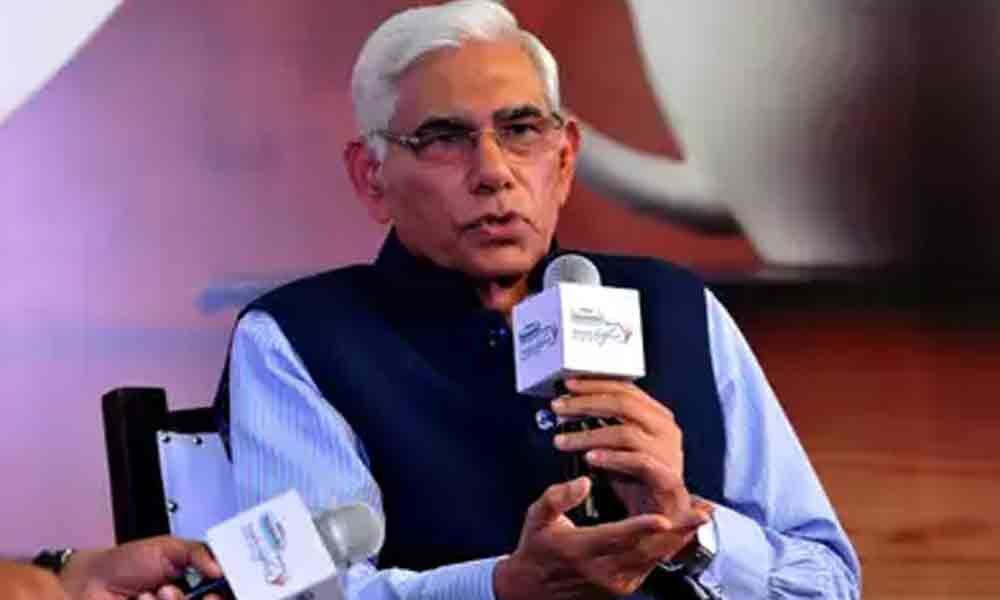Live
- GMR Airports Unveils AI-Powered Digital Twin Platform to Transform Airport Operations
- India poised to become leading maritime player: PM Modi
- Top Causes of Kidney Stones and How to Recognize Silent Symptoms
- India’s renewable energy capacity logs 14.2 pc growth at 213.7 GW
- Winter Session of Odisha Assembly adjourned sine die
- Biden calls Trump's tariff approach 'major mistake'
- After Drama Over Eknath Shinde’s Chief Minister Race, Maharashtra Cabinet Formation Faces New Tensions
- Egyptian FM, Blinken discuss recent developments in Syria
- Iran's supreme leader says Syria's developments result of US-Israeli 'plot'
- Elon Musk to Purchase $100 Million Luxury Mansion Next to Donald Trump's Mar-a-Lago, Report Reveals
Just In
CBI should have arm's length relationship with govt: Vinod Rai


There is an urgent need to empower the CBI with a distinct mandate of keeping an "arm's-length" relationship with the government, says former Comptroller and Auditor General Vinod Rai.
New Delhi : There is an urgent need to empower the CBI with a distinct mandate of keeping an "arm's-length" relationship with the government, says former Comptroller and Auditor General Vinod Rai.
He is also of the view that the CBI seems to be becoming a 'handmaiden' to investigate, if not intimidate and the onus is now on the government to cut its losses and set about ensuring that it is not held guilty of allowing the credibility of these institutions to hit rock-bottom during its tenure.
He feels that an alert PAC holding frequent meetings would be a very effective instrument to keep the executive under constant scrutiny and bring it to book when there are signs of laxity, wastage or malfeasance.
The former IAS officer has come out with a book titled "Rethinking Good Governance: Holding to Account India's Public Institutions" in which he stresses how important these institutions are to serve as the pillars supporting the foundation of a robust and vibrant democracy.
From numerous occasions when MPs failed to adhere to the decorum expected of lawmakers in the House, the serious deficit of impartiality and integrity within the CBI, to the issue of governance that has plagued the BCCI, and the imbroglio around the perceived lack of cohesion between the government and the RBI, Rai claims that such instances led to a gradual decline of the independence and autonomy of these institutions over the decade.
He suggests that the role of prosecutors in the CBI needs overhauling as the agency does not have a very encouraging track record of successful prosecution, especially in high-profile cases.
"Often, the director of prosecution plays a secondary role and gets swamped by the same political allegiances that bedevil the director of the organisation, especially when the director gets the appointment after lobbying and hence ab initio starts with an 'I owe you' tag," he writes in the book published by Rupa.
He also says that increasingly, there is a decline in the professional capability of officers being appointed to the agency with a preference for 'loyal' officers. "This has become a dangerous trend, resulting in prosecutions proving to be increasingly faulty."
According to Rai, accountability institutions that form the foundational pillars of any democracy seem to be losing their structural strength. "That is probably the reason an otherwise decisive government did not see or, if it saw, did not act on early warning signs."
"The CBI seems to be becoming a 'handmaiden' to investigate, if not intimidate. The onus is now squarely on the government to cut its losses, and, wielding the hammer, set about ensuring that it is not held guilty of allowing the credibility of these institutions to hit rock-bottom during its tenure," he writes.
"Considering that the agency seems to be the final port of call for any major act of crime or corruption, there is an urgent need to arm it with a distinct mandate of keeping an 'arm's-length' relationship with the government.
This should be genuine and not undertaken merely for visibility purposes," he adds. Rai, who is the chairman of the Supreme Court-mandated Committee of Administrators of the BCCI, says the Indian cricket board prided itself on having a management system presided over by the most experienced cricket administrators in the land.

© 2024 Hyderabad Media House Limited/The Hans India. All rights reserved. Powered by hocalwire.com






